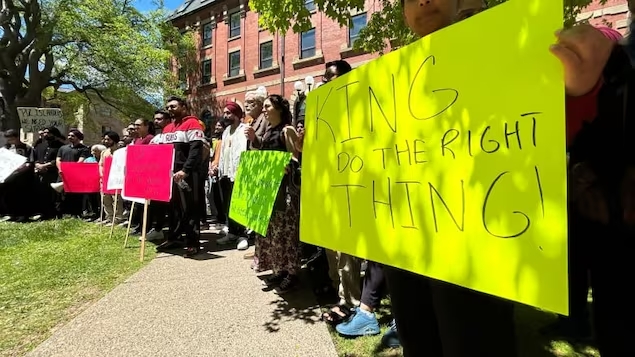Canada News
Business representatives say P.E.I.’s immigration policy changes affecting the labour force

Protesters gathered outside the Coles Building in downtown Charlottetown while representatives from P.E.I.’s business community made presentations to MLAs inside. (Tony Davis/CBC) PHOTO: (TONY DAVIS/CBC)
‘We need immigration, it’s just math,’ says Charlottetown chamber of commerce CEO
About 100 protesters gathered in Charlottetown on Thursday asking for changes to P.E.I.’s immigration policy to be rolled back, while business representatives told MLAs that the new rules are hurting employers in the sales and service sector.
An immigration consultant and representatives from both the Charlottetown and Eastern P.E.I. chambers of commerce told the standing committee on education and economic growth that business owners are already seeing negative effects from the province’s policy change.
The P.E.I. government announced in February that it would cut the number of people it nominates for permanent residency by 25 per cent in 2024. The change will drastically reduce the number of nominations for workers in the sales and service sector, from 855 last year to 215 this year in favour of more in-demand areas like health and construction.
It’s been really concerning, and people are worried that they’re going to lose more workers and that they won’t be able to provide or maintain the level of service that they normally would,
Bianca McGregor, the CEO of the Greater Charlottetown Area Chamber of Commerce, told MLAs during the committee meeting.
McGregor worries P.E.I. doesn’t have the workers to fill jobs immigrants may leave empty when their work permits expire.
To put it into context, in 1980 there were 24 people for every 10 vacancies. Now there are seven people for every 10 vacancies,
she said. So we need immigration, it’s just math.
Blake Doyle, an immigration consultant and past president of the Greater Summerside Chamber of Commerce, said he’s heard from businesses that have already lost workers.
There’s a real concern that if people aren’t allowed to continue their permits … they’re going to lose staff,
he said.
Doyle and McGregor both said those concerns are heightened as the summer tourism season approaches.
Grateful for support
The protesters have been gathering daily for weeks, and in late May went on a weeklong hunger strike. Many protesters are service sector and retail workers who won’t be able to renew their work permits under the new system.
We need to be grandfathered in as we were here way before [the policy change],
said Jaspreet Singh Sivia, one of the workers whose permit is expiring this summer.
Sivia is glad to receive support from the business community, and said the demonstration will continue until the immigration changes are rolled back.
‘WE HAVE ENGINEERS BAKING MUFFINS’: BUSINESS LEADERS PUSH FOR CHANGES TO P.E.I.’S IMMIGRATION POLICY
As foreign workers protested P.E.I.’s new immigration policy outside the Coles Building, representatives from the province’s business community were inside making their case against the changes to MLAs. Charlottetown Chamber of Commerce CEO Bianca McGregor and Blake Doyle, a past president of the Summerside chamber, described how Island business owners felt blindsided by the policy, and made some suggestions of their own to the province.
He said the protesters agreed to pause their hunger strike in good faith when provincial officials asked them to, but Sivia said the government didn’t provide any new solutions.
They were giving us other invalid options like LMIA [Labour Market Impact Assessment] or other jobs and jobs with other employers,
he said. But we already know, we have already tried those invalid options.
Labour Market Impact Assessments refer to documents that employers can fill out (new window) to prove to the federal government that they need to hire foreign workers to fill job vacancies.
In the meantime, Sivia said there’s already been a direct impact from some workers leaving their jobs and the province.
As more and more employees leave, there are not enough workers to cover the shortages,
he said. So they’re suffering huge losses and a huge economic loss as well.
Consultation in 2025
The province told the chambers of commerce that they’ll be invited to be part of the consultation process for allocating permanent residencies in 2025, but there won’t be any changes this year.
The business community says that’s concerning.
The big issue is that there was no forewarning that this might happen,
McGregor said. And in the business community, the more time and more heads up we have, the better we can pivot.
Doyle says he thinks the P.E.I. government should look to Manitoba, where the provincial government lobbied Ottawa to extend temporary resident status for people who were already there.
There’s a number of things that we went through and presented, and I think they’re all very valid,
Doyle said. Hopefully the committee liked what they heard and can enact many of them.
‘It’s so devastating inside’
Later Thursday, the Eastern P.E.I. and Summerside chambers held another public meeting about the policy changes at Jack Blanchard Hall in Charlottetown.
Attendee Zalik Modi, a newcomer from India, said her work permit for a job in the sales and service sector expires soon.
Modi said she feels the government is turning its back on the workers it counted on to stabilize the economy during the COVID-19 pandemic.

Zalik Modi says it’s devastating to work so hard to stay in Canada, only to have it taken away and not be given other options. (Rob LeClair/CBC) PHOTO: (ROB LECLAIR/CBC)
It’s so devastating inside,
she said. You really start thinking of your existence, like what did you accomplish, what did you really do in this country?
Her plan for permanent residency may now be out of reach, something she said has affected her mental health.
I cry,
she said. This is what I’m facing.
Some supporters in the audience like Mohit Bhardwaj have already obtained their permanent residency. Bhardwaj immigrated from India in 2016, and got his permanent residency in February.
He said it was a difficult eight years, moving from Ontario to P.E.I. to use the pathways here to get a nomination.
I was working in the service industry and it was in a very big demand at that time,
he said. We came here for a better future. We came here for a bright future, to build a life.
Bhardwaj said if the province goes ahead with its plan to cut work permits from the sales and service sector, it would be disastrous.
Victoria Walton (new window) · CBC News
This article is republished from RCI.





















